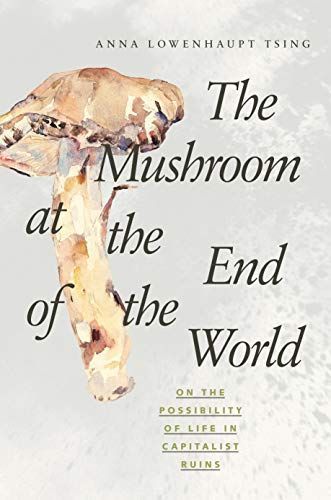
The Mushroom at the End of the World On the Possibility of Life in Capitalist Ruins
Matsutake is the most valuable mushroom in the world--and a weed that grows in human-disturbed forests across the northern hemisphere. Through its ability to nurture trees, matsutake helps forests to grow in daunting places. It is also an edible delicacy in Japan, where it sometimes commands astronomical prices. In all its contradictions, matsutake offers insights into areas far beyond just mushrooms and addresses a crucial question: what manages to live in the ruins we have made? A tale of diversity within our damaged landscapes, The Mushroom at the End of the World follows one of the strangest commodity chains of our times to explore the unexpected corners of capitalism. Here, we witness the varied and peculiar worlds of matsutake commerce: the worlds of Japanese gourmets, capitalist traders, Hmong jungle fighters, industrial forests, Yi Chinese goat herders, Finnish nature guides, and more. These companions also lead us into fungal ecologies and forest histories to better understand the promise of cohabitation in a time of massive human destruction. By investigating one of the world's most sought-after fungi, The Mushroom at the End of the World presents an original examination into the relation between capitalist destruction and collaborative survival within multispecies landscapes, the prerequisite for continuing life on earth.
Reviews
martian1138@martian1138
Annie Millman@anniemillman
Ianna Chia@eyeyannuh
Molly M@molsmcq
minji kim@lovehaejuseyo
Karis Ryu@karisr
Liam Richardson@liamactuallyreads
Katie Chua@kchua
Amanda Jones@pagesofmay
Angbeen Abbas@angbeen
Minjae@mjseason
Elena Kuran@elenakatherine
Nicholas Barnard@coldfruits
Jo A@thecupofjo
César Steven Toribio@cesarsteven
Muriel Trystero@trystero
Eva Decker@evadecker
Tiffany@scientiffic
Julia@parula
Paul Meskers@clams
Caroline@carowil
Zoe Proegler@zoeprglr
Andrew J Coffey@andycoffey
Highlights
Jini R@jiriu
Page 47
aisha@aishas
Page 52
tasha@miku